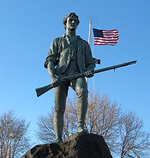The Future of the Right to Keep and Bear Arms
Civil Rights Practice Group
 In 2008, for the first time in our history, the Supreme Court invoked the Second Amendment to strike down a gun control law, holding that the federal government may not prohibit law abiding citizens from keeping a handgun in the home for self defense. In 2010, the Court held that state and local governments are also prohibited from banning handguns in the home. Major victories for individual liberty, those decisions were also very narrow. Can we expect future decisions to recognize a wide range of rights to keep and bear arms? Or will the Court's recent decisions turn out to be mostly symbolic, with little effect on legislative discretion to regulate access to firearms? Please join us for a discussion of opposing views about what the courts are likely to do and what they should do.
In 2008, for the first time in our history, the Supreme Court invoked the Second Amendment to strike down a gun control law, holding that the federal government may not prohibit law abiding citizens from keeping a handgun in the home for self defense. In 2010, the Court held that state and local governments are also prohibited from banning handguns in the home. Major victories for individual liberty, those decisions were also very narrow. Can we expect future decisions to recognize a wide range of rights to keep and bear arms? Or will the Court's recent decisions turn out to be mostly symbolic, with little effect on legislative discretion to regulate access to firearms? Please join us for a discussion of opposing views about what the courts are likely to do and what they should do.
Co-sponsored by The Cato Institute's Center for Constitutional Studies
 In 2008, for the first time in our history, the Supreme Court invoked the Second Amendment to strike down a gun control law, holding that the federal government may not prohibit law abiding citizens from keeping a handgun in the home for self defense. In 2010, the Court held that state and local governments are also prohibited from banning handguns in the home. Major victories for individual liberty, those decisions were also very narrow. Can we expect future decisions to recognize a wide range of rights to keep and bear arms? Or will the Court's recent decisions turn out to be mostly symbolic, with little effect on legislative discretion to regulate access to firearms? Please join us for a discussion of opposing views about what the courts are likely to do and what they should do.
In 2008, for the first time in our history, the Supreme Court invoked the Second Amendment to strike down a gun control law, holding that the federal government may not prohibit law abiding citizens from keeping a handgun in the home for self defense. In 2010, the Court held that state and local governments are also prohibited from banning handguns in the home. Major victories for individual liberty, those decisions were also very narrow. Can we expect future decisions to recognize a wide range of rights to keep and bear arms? Or will the Court's recent decisions turn out to be mostly symbolic, with little effect on legislative discretion to regulate access to firearms? Please join us for a discussion of opposing views about what the courts are likely to do and what they should do.
Featuring:
- Mr. Alan Gura, Gura & Possessky, P.L.L.C.
- Mr. Dennis Henigan, Brady Center to Prevent Gun Violence
- Prof. Nelson Lund, George Mason University Law School
- Prof. Alan B. Morrison, The George Washington University Law School
- Moderator: Mr. Roger Pilon, Center for Constitutional Studies, Cato Institute
Lunch will be served.
There is no charge for this event.
Online registration for this event is now closed.
Walk-ins are welcome, but a seat and lunch are not guaranteed if you did not register online.
If you can't make it to the Cato Institute, watch this Forum live online at http://www.cato.org/.


